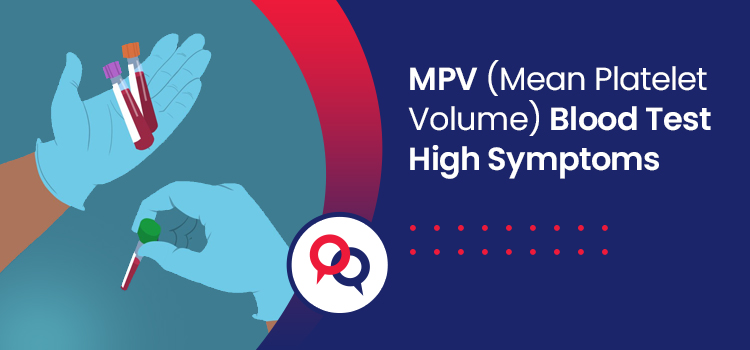
If you’ve recently had a blood test and found that your MPV is high, it can be worrying and confusing. Naturally, many people have questions about this result and would like to learn more.
An MPV (mean platelet volume) blood test measures the size of the average platelet in your bloodstream, providing important information about your health – so understanding any indicators of potential danger is essential for good medical care.
In this blog post, we will explore what an elevated mean platelet volume indicates, associated symptoms that may arise, as well as treatment options available depending on the cause behind the increase.
What is an MPV Blood Test and Why is it Done
An MPV Blood Test (mean platelet volume) is a test that measures the size of your platelets. Platelets are small cells in your bloodstream that help stop bleeding by clumping together and forming plugs to seal off damaged blood vessels.
The MPV test can provide important information about how well your body is able to form these clots. It is often done along with a complete blood count (CBC) to check for any signs of clotting problems, infection, or other health issues.
In some cases, an MPV test may be used to help diagnose and monitor conditions such as thrombocytopenia (low platelet levels), leukemia, and other blood disorders.
What Causes an Elevated MPV Reading
An elevated MPV reading can be caused by a variety of things, including:
- An increase in the production or lifespan of platelets. This can be due to an underlying medical condition such as polycythemia vera, thrombocytosis, or essential thrombocythemia.
- Higher than normal levels of fibrinogen in the body, which can be caused by chronic inflammation.
- Certain medications, such as some anticoagulants and antiplatelet drugs.
- Bacterial or viral infections that increase platelet production.
- Trauma or surgery could also lead to an increase in MPV levels.
- A genetic defect that affects platelet production or lifespan can also be a cause of an elevated MPV reading.
Symptoms that May Accompany an Elevated MPV Reading
The MPV blood test measures the average size of platelets, which are important for clotting and preventing bleeding. An elevated MPV is indicative of an increased production of platelets in the bone marrow or a decreased destruction of them in the bloodstream.
An elevated reading may be caused by certain conditions such as cancer, liver or kidney disease, hypothyroidism, or autoimmune disorders.
When an elevated MPV is present, it may be accompanied by certain symptoms depending on the underlying cause of the reading.
It is important to note that not all people with high MPV readings experience symptoms; therefore, if you suspect an increased platelet count, it is important to consult a healthcare professional for further testing.
Common symptoms that may accompany an elevated MPV reading include:
- Easy or excessive bruising
- Frequent nosebleeds
- Prolonged bleeding from cuts or abrasions
- Small red spots on the skin, which may be indicative of petechiae
- Unusually heavy menstrual bleeding
- Unexplained and persistent fatigue
When to Seek Medical Attention for High MPV Readings
If you have a high MPV reading, it’s important to seek medical advice from your doctor. High MPV readings can be the result of diseases such as leukemia and lymphoma, so it’s important to have a full physical examination done to rule out any underlying conditions.
Your doctor may suggest additional tests like a complete blood count (CBC) or a bone marrow biopsy to determine the cause of the high MPV reading.
Depending on your medical history, family history, and any other symptoms you’re experiencing, your doctor may also suggest lifestyle changes such as eating healthier foods and getting regular exercise.
Making these changes can help bring down your MPV levels and reduce your risk of serious health issues.
Treatment Options for High MPV Readings
Treatment options for high MPV readings will depend on the underlying cause. Common treatment plans include:
- Improving lifestyle habits, such as getting regular exercise and eating a healthy diet with plenty of fruits and vegetables.
- Taking medications to control the underlying condition, such as cholesterol medication or blood pressure medication.
- In more severe cases, blood transfusions may be necessary.
- If the high MPV reading is caused by an infection, antibiotics may be prescribed.
- In some cases, surgery may be needed to remove a blockage or damaged tissue.
It is important to discuss all treatment options with your doctor and carefully follow their instructions for the best results. Taking preventive measures, such as maintaining a healthy lifestyle and getting regular checkups, can help reduce the risk of high MPV readings in the future.
It is important to note that there is no one-size-fits-all solution for high MPV readings; treatment must be tailored to each individual’s specific needs and medical history. If you have any questions or concerns, be sure to speak with your physician.
Conclusion
In summary, the MPV blood test is an important diagnostic tool for understanding our platelet counts. Higher than normal platelet levels may be caused by a range of conditions or treatments, and can cause varying symptoms or complications if left unchecked.
If one suspects that they have an elevated MPV count, it is best to visit a doctor, who can investigate and determine the potential causes. Treatment options vary from medication, lifestyle changes or even surgery, depending on the diagnosis, so medical advice should always be sought.
Furthermore, if you find yourself requiring a second opinion, modern technology has made it easier to seek medical advice without visiting a physical location— look into apps that allow you to ask doctor consultations online with ease. With all this in mind, it’s important to remember one thing: your health is worth taking seriously and doing what you can to stay as healthy as possible.
